Tag: Grace
My Grace is Sufficient for You
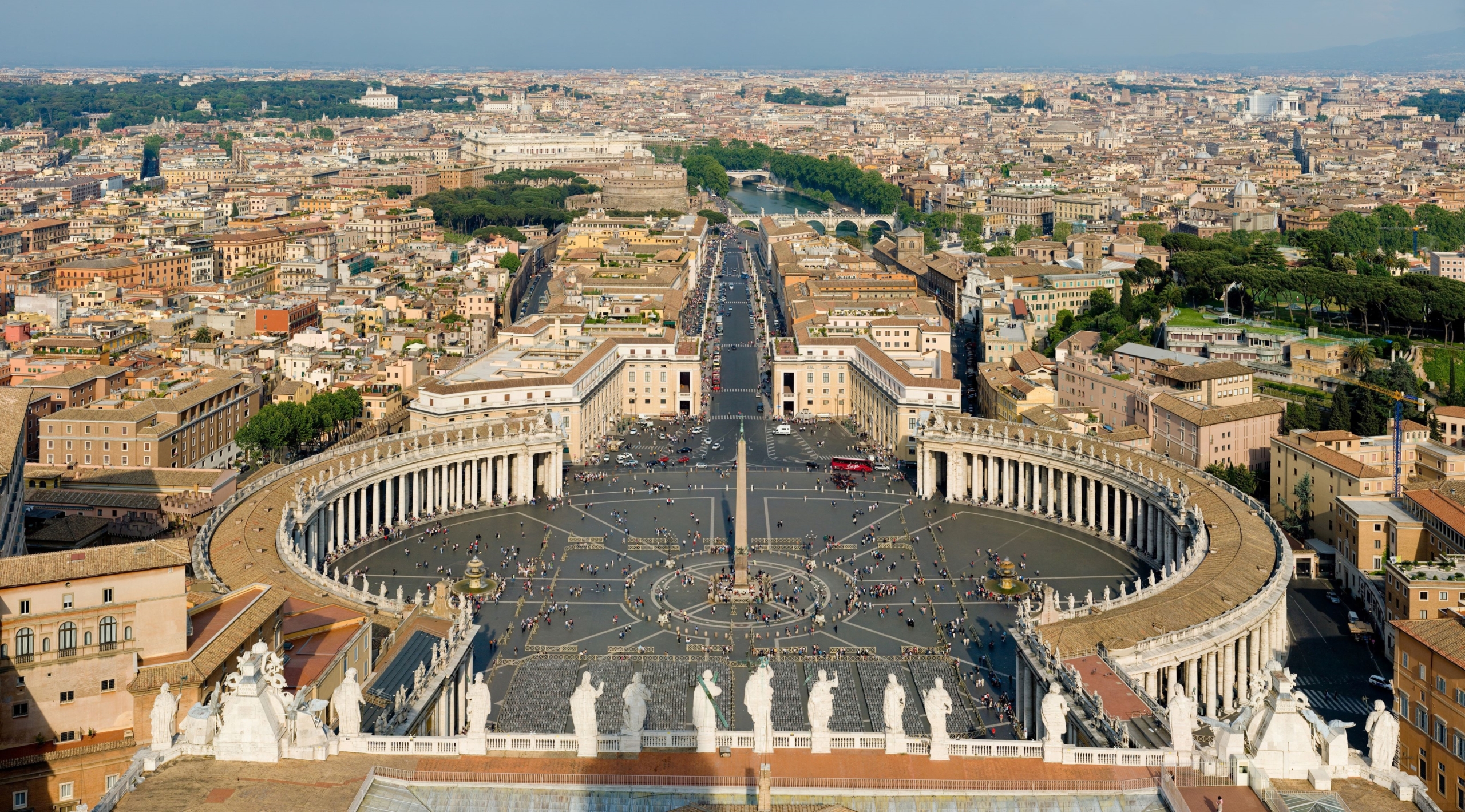
“All of this is because a fisherman died here,” said my then friend, now fellow Dominican Brother, as we stood atop St. Peter’s Basilica in Rome. It is true. The fisherman from Galilee, buried 450 feet below us, was certainly not wise by human standards, powerful, nor well born. (1 Cor 1:26). He was not preserved from serious sins like Mary, John the Baptist, or John the Evangelist. This was the disciple who denied Our Lord three times (Luke 22:54–61). Nonetheless, our Lord still called Simon son of Jonah. He built his Church on him and gave him the keys to the Kingdom of Heaven (Matt 16:17–18). He told him to feed his sheep and foretold his martyrdom on the Vatican hill (John 21:15–19). This calling and the grace our Lord gave to this weak fisherman turned him into a strong fisher of men, and shepherd of souls.
From the top of St. Peter’s we could also see another massive basilica down the Tiber. This one does not house the bones of a fisherman. Rather, it is built over the tomb of a radical first century pharisee (Phil 3:4–6). A man not even fit to be called an apostle because he persecuted the Church of God (1 Cor 15:9). A man who consented to the execution of St. Stephen (Acts 8:1) and tried to destroy the Church (Gal 1:13). Yet this man, this sinner, was chosen by God’s grace. This man was struck down on the road to Damascus (Acts 9:1–9), and encountered the Risen Lord (Gal 1:12). These two men, one uneducated and ordinary (Acts 4:13), and the other an enemy of God (Rom 5:10), were reconciled to God! They became Peter, the rock on which the Church is built (Matt 16:17) and Paul, God’s chosen instrument (Acts 9:15).
These two sinners-turned-saints are useless on their own. Peter is not the rock of his own Church; he is the rock on which Christ builds his Church. So too Paul, as a chosen instrument of grace, is nothing without someone to use the instrument, namely Christ. These two men remind us that without God we can do nothing (John 15:5). For these men are apostles only because Jesus is “the apostle and high priest of our confession” (Heb 3:1). They are bishops and shepherds only because Jesus is “the shepherd and bishop of our souls” (1 Pet 2:25).
Despite their sins, despite their mediocrity, God did amazing things with these two men. God made them like Jesus. God used their suffering to “fill up what is lacking in the afflictions of Christ on behalf of his body, which is the church”(Col 1:24). He made them a spectacle to the world, being hungry and thirsty, naked, roughly treated, homeless, and toiling (1 Cor 4:11–12). He made them like Jesus who had nowhere to rest his head (Matt 8:20). God took these men and conformed them to Jesus Christ, using them to bring his gospel to the ends of the earth (Ps 19:4). This conformity to Jesus went deep; he even gave Paul his marks on his body (Gal 6:17).
In the end this transformation, begun on the beach in Galilee and on the road to Damascus, ended in Rome. Peter was so configured to the cross of Christ, that he, like the savior, was crucified. So too Paul was executed in the same city by beheading. However, their martyrdom was not merely the result of their work in the Lord’s vineyard. The grace of final perseverance was a gift, but it was not only a gift for these blessed Apostles. This final grace given to Peter and Paul extends to you and me! The same grace God used to save them, he now uses through them to save us. So that just as their voices went out through all the world in their earthly life, their prayers in heaven now bring us the graces of Jesus Christ!
Tomorrow the Church celebrates the principal feast of these heavenly patrons. Let us turn to them as our fathers and sources of Sacred Scripture and the Tradition of the Church. But more than that, let us turn to them because they are reigning in heaven! The rock still supports the Church, and the chosen instrument still intercedes for men.
Photo by David Iliff (CC BY-SA 3.0)
Originally posted on Dominicana Journal on June 28, 2022
Offering it up for Others
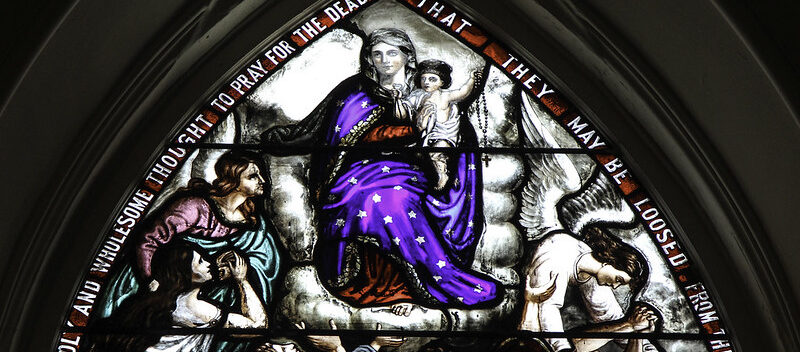
“Offer it up” is a phrase well-known to Catholics both young and old. It is a phrase that we often use to satirize stern teaching-sisters and good Catholic mothers alike. But, despite its worn familiarity, it is a phrase that has not yet lost its use! In Spe salvi Pope Benedict XVI said that “offering it up” is a way that “even the small inconveniences of daily life could acquire meaning and contribute to the economy of good and of human love” (Spe salvi, 40). Furthermore, he suggested that “maybe we should consider whether it might be judicious to revive this practice.” Especially during this month dedicated to the remembrance of the deceased, we can make an effort to offer up our suffering on behalf of those souls in Purgatory.
The reality of human suffering in a world ruled by “a God gracious and merciful, slow to anger and abounding in love and fidelity” (Exod 34:6) is a profound mystery. St. Thomas Aquinas writes that God’s allowance of suffering is part of God’s infinite goodness so that out of that suffering he can produce immense good (ST I, q. 2, a. 3). From blind beggars and sick servants to the crucifixion of Christ, the Gospel is filled with examples of Jesus transforming sickness and suffering into prosperity and joy. This transformation is also possible in our lives. When we realize that God permitting our suffering is a part of his goodness, we are able to sanctify it by “offering it up” to God.
When faced with suffering, we can do one of two things. We can reject that our pain has any meaning or purpose, or we can offer up our daily struggles. By offering it up, we accept our suffering and acknowledge that God can bring good out of it. Our suffering can open the door to our sanctification. When we offer up these moments, we hand them over to God, and he transforms them into acts of love. “Offering it up” can be as simple as praying:
Dear Lord, I offer you my suffering today
For the conversion of sinners,
For the forgiveness of sins, and
For the salvation of souls. Amen.
All suffering, from mild discomfort to profound miseries, can be offered to God. When I was a child, my parents told me to “offer up” small paper cuts, childhood disappointments, lack of desserts, and other seemingly inconsequential discomforts. Even with small struggles like these, God can produce substantial good because, in them, we find an opportunity to unite ourselves to Christ’s suffering. By accepting our suffering, we take up our crosses, where “Christ’s sufferings overflow to us” (2 Cor 1:5). By handing over our suffering to Christ, we join ourselves to the suffering he endured for us, “sharing of his sufferings by being conformed to his death” (Phil 3:10). It is by joining ourselves to Christ’s suffering that we can make expiation for our own sins and more perfectly conform ourselves to God’s will.
In addition to being sanctified ourselves, we can offer our suffering for the sanctification of others—especially for those in Purgatory. The souls in Purgatory cannot help themselves; they rely on our prayers for relief. (ST II-II, q. 83, a. 11) We can and should always pray for them. By turning to prayer during moments of suffering, joining ourselves to Christ’s cross, and offering our sufferings for the souls in Purgatory, we can say with St. Paul, “I rejoice in my sufferings for your sake, and in my flesh I am filling up what is lacking in the afflictions of Christ on behalf of his body, which is the church” (Col 1:24).
Image: Photo by Fr. Lawrence Lew, O.P. (used with permission)
Originally posted on Dominicana Journal
She Who Received
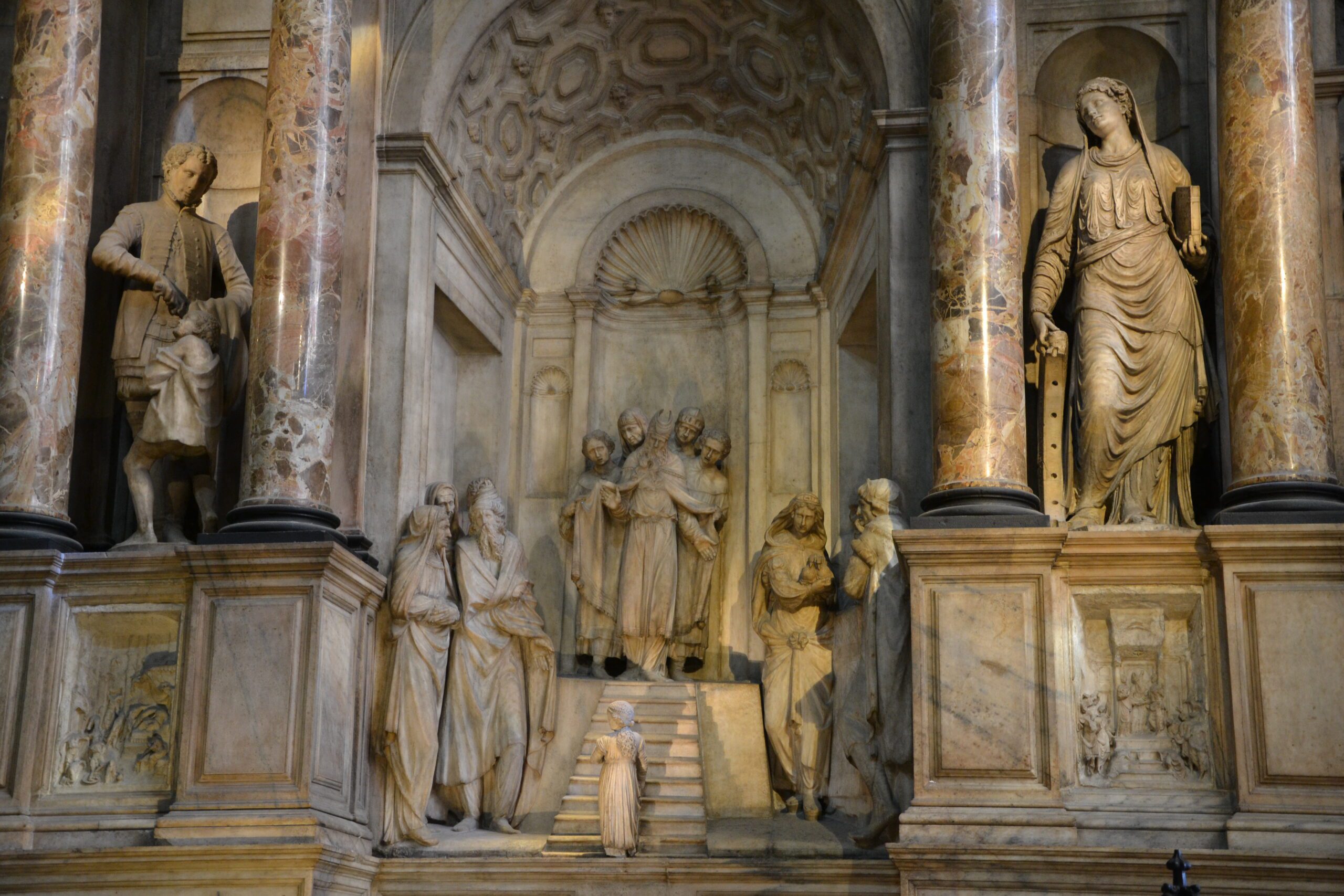
Addressing the Father, Saint Catherine of Siena said in her Dialogue, “I am she who is not. . . . You alone are he who is; my being and every other grace that you have given me beyond my being I have from you, which you gave and give to me through love, and not because it was owed to me” (Ch. 134; cf. Exod 3:14). Since only God exists by his own power and because everything else exists only because he created, Catherine recognized that everything she was and had came from God. To sin—to turn away from God and towards oneself—would be to turn toward nothingness.
What we are apart from God is an abyss of nothingness. The more we retreat from God to follow our own whims and desires, the lesser and lesser we become. God owes us nothing; everything he gives he gives out of love. If someone wants to be or become anything, she must totally deny herself—she must become she who is not—in order to cling entirely to God: he who is. She must make herself completely dependent on his love.
No one recognized this more than the Immaculate Virgin Mary, whom God joined to himself from the instant she was conceived in the womb. Her Immaculate Conception might have been fitting, but God did not owe her anything. Nor was it absolutely necessary for him to do this in order to redeem the human race. What he did for her he did out of sheer love. He did it out of love for her, whom he loved above all creatures. He did it out of love for himself since, aside from Christ’s human nature, Mary glorified him more than any other creature (Luke 1:46). He did it out of love for us, her children.
For Eve was the mother of all the living who later die and turn to nothingness (Gen 3:20). At her instigation, our first parents sinned when they tried to be something apart from God. From them, we inherited original sin. But Mary, the new Eve, became the Mother of all who live by grace (Rev 12:17). She emptied herself of her will and accepted the will of God announced by the angel (Luke 1:38). Her soul “magnified the Lord,” who, she said, had favored her “lowliness.” For it was he who “scattered the proud in the imagination of their hearts” and “cast down the mighty from their thrones” in order to “lift up the lowly”—those who count themselves nothing before God (Luke 1:46–55). It was Mary who instigated her Son to begin his ministry when she commanded the servants at Cana to be obedient to Jesus, to be nothing before her Son, he who is (John 2:5). Just as the first Adam had done when—after he first turned the human race away from its Creator—he named the first Eve “Mother of all the Living,” so the new Adam—once he turned the human race back to the Father—named the new Eve our Mother when he gave her to his beloved disciple (John 19:25–27). All of us who turn, not toward ourselves and to nothingness but to he who is (cf. John 18:6), are her children.
But the foundation for Mary’s Motherhood began with the grace God gave her at her conception. This was what the angel acknowledged first: “Hail, full of grace, the Lord is with you” (Luke 1:28). She received the human nature that God first gave to Adam and Eve, but not original sin. Through her Immaculate Conception, God gave Mary grace to receive everything from him and from him alone. By giving her this grace, he prepared her to receive he who is. By his power alone, she would receive everything that she was. By his power alone, Mary would later conceive he who is in her womb. By his power, she who is not would hold he who is in her arms.
Image: Image: Carlo dell’Orto, La Presentazione di Maria al Tempio (CC BY-SA 3.0)
Originally posted on Dominicana Journal
Spiritual Hunger
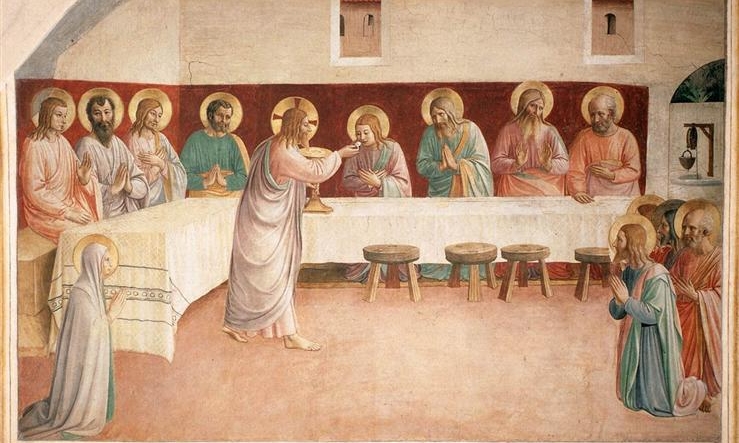
At a convent of the Missionaries of Charity, my mother once made twelve bags of food to give to the homeless. She and the sisters then went to one of their usual spots in my hometown to hand out the bags of food, where there were never more than twelve people. However, upon arrival my mother discovered that there were, not twelve, but thirty-six homeless. Panicking, she told one of the sisters that they should go to another spot because there would not be enough bags of food for the crowd. The sister replied that my mother should start praying the Memorare prayer. So the sisters and my mother gathered the homeless together, prayed with them, and my mother proceeded to hand out the bags of food. When the last bag was handed out, everyone had a bag in their hands.
This happened when I was a child, and because of it, the Gospel story of the Feeding of the Five Thousand has always struck a special cord in my heart. This story also seems to have hit a special cord with the Gospel writers as well, given that it is the only miracle that is recounted in all four Gospels (Matt 14:13-21, Mark 6:34-44, Luke 9:10-17, John 6: 1-14).
The evangelists knew the significance of this miracle story not only because the miracle itself shows the powerful and providential care of Jesus for his people, but also because of what Jesus is pointing towards in this miracle. This miracle points us to the Holy Sacrifice of the Mass, where Jesus’ sacrifice at Calvary is presented and where Jesus gives his Body and Blood to the Church as the healing food for our souls. In fact, the Book of Revelation even shows us that the same liturgy we celebrate in the Mass on earth is celebrated in Heaven. Each Mass, we should call to mind the communion of saints and angels all around us.
This all came together in the most beautiful way during one of my summer visits home. I was at mass right next to my mother. I watched as a packed congregation on a Saturday noon mass came up for communion. I couldn’t help but see us in the same light as the five thousand whom our Lord looked on with pity. Just as the five thousand were hungry for food, we were spiritually hungry for our Lord. As the apostles stood in the place of Jesus when they brought food to the five thousand, so the elderly priest stood in persona Christi as he slowly distributed the Eucharist from person to person along the communion rail.
Studying to be a priest of Jesus Christ, I can now see how, by reflecting on my mother’s miracle story, Jesus was using that event to point me to something higher. God will always look with pity on his children and will always provide priests of Jesus Christ to offer up the eternal sacrifice of Jesus for the sanctification of souls. Let us remember that every time we come to mass, we are entering into the sacrifice of Jesus for our sins and pray for a renewed spiritual hunger for Jesus in the Eucharist. Blessed are those called to the Supper of the Lamb.
Image: Fra Angelico, The Institution of the Eucharist
Originally posted on Dominicana Journal
God is Not Far From Us
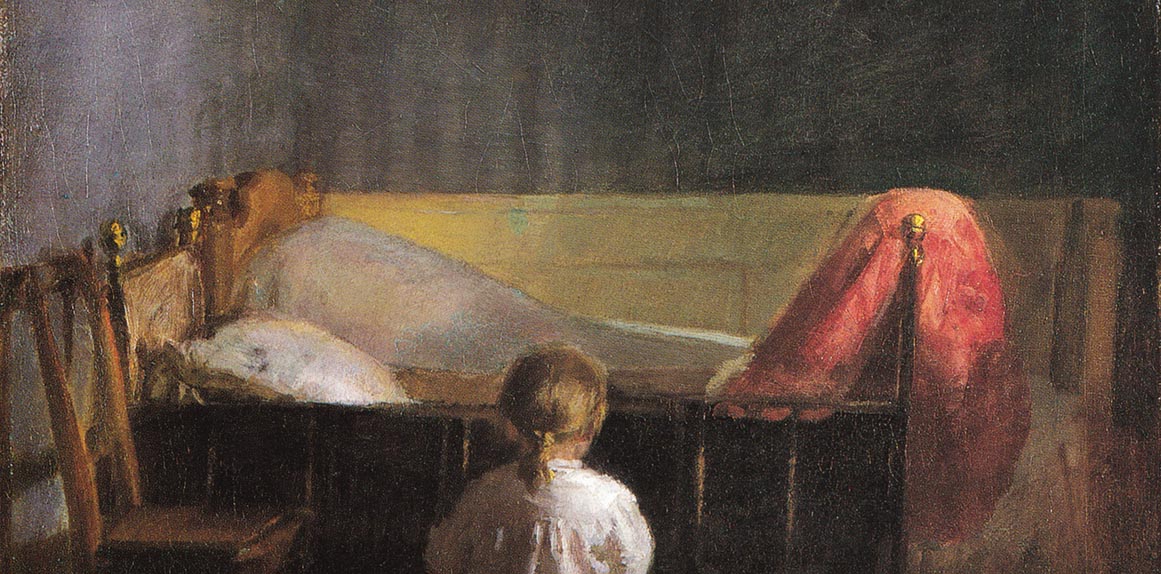
Pause for a minute and consider God.
Where does your mind take you?
I think for most of us the mind goes outward. We imagine God somewhere way out there beyond the stars and outer limits of the cosmos. From his seat faraway, he admires all he has made, and if we’re lucky, he might even look upon one of us with his favor.
This perspective is problematic.
First, God does not have a body; he is therefore not “in a place” or “far away.” “Where” is he then? Everywhere. Saint Paul teaches, “He is actually not far from each one of us, for ‘In him we live and move and have our being’” (Acts 17:27b-28a). I am because God is. Those things that are deepest in me—my life, my ability to will this or that, my very existence—are caused at all times and in all places by God’s innermost presence (cf. Thomas Aquinas, ST I, q. 8, a. 1). The hand holding a cup of coffee four feet from the ground is like God holding me in being. His “right hand holds me fast” (Ps 63:9 Grail), and he does not let go. “Where shall I go from your Spirit? Or where shall I flee from your presence? If I ascend to heaven, you are there! If I make my bed in Sheol, you are there!” (Ps 139:7-8). Wherever I am, there God is. Reason alone can even lead us to this awesome conclusion.
Beyond reason’s ambit, however, there lies a yet more profound truth about God’s nearness to the human soul. The Son reveals this truth: “If anyone loves me, he will keep my word, and my Father will love him, and we will come to him and make our home with him” (John 14:23). The Son reveals that God is a communion of Persons—Father, Son, and Holy Spirit—who dwell together in perfect unity (cf. John 10:30). The Son reveals that God has invited us to share in this communion. The Son reveals that our sharing in this communion is made possible by God dwelling in our souls. When the soul is in a state of grace, God is inwardly present not only as sustainer and mover, but as light and fire making us capable of divine knowledge and love (Thomas Aquinas, ST I, q. 43., a. 3). The Father sends his Son, “the light of men” (John 1:4), to illuminate our minds with the truth of God. The Father and the Son send the Holy Spirit to enflame our hearts with the love of God (Rom 5:5; cf. John 14:16). And where the Son and the Spirit are, there too is the Father. The body becomes a temple for the Triune God (1 Cor 6:19).
It is not altogether wrong for the mind to go outward in contemplating God. God is wholly other. An infinite gap separates the Creator and the creature. My existence (the entire world’s existence!) is not necessary. God, on the other hand, is his own existence and he necessarily is: “I am who I am” (Ex 3:14). But precisely because of God’s supreme transcendence, he is most inwardly in all that is. The Christian at prayer contemplates a truth yet more marvelous. Gazing inwardly not to consider himself but to consider God, he might pray,
O my God, Trinity whom I adore, help me to forget myself entirely that I may be established in you as still and as peaceful as if my soul were already in eternity.
May nothing trouble my peace or make me leave You, O my Unchanging One, but may each minute carry me further into the depths of Your Mystery.
Give peace to my soul; make it Your Heaven, Your beloved dwelling and Your resting place. May I never leave You there alone but be wholly present, my faith wholly vigilant, wholly adoring, and wholly surrendered to Your creative Action
(Saint Elizabeth of the Trinity, Prayer to the Holy Trinity).
Image: Anna Ancher, Evening Prayer (Wikimedia Commons)
Originally posted on Dominicana Journal
